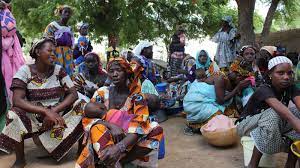The number of Malians facing hunger has increased nearly threefold in one year, warns a coalition of 22 humanitarian organisations working in the country.
In a statement sent to APA on Thursday the Humanitarian Working Group of the International NGOs Forum in Mali (FONGIM) blamed the growing hunger to the triple whammy effects of growing insecurity, droughts and the Covid-19 pandemic.
“Food security is threatened on many fronts in Mali. The situation will go from bad to worse for millions of vulnerable people if we don’t act now, with projections indicating a further 58 percent increase in the number of food insecure people next year,” said Adeline Benita, FONGIM’s Director.
According to FONGIM levels of hunger are the highest recorded since the beginning of the Malian crisis in 2012 with drought worsening and leading to the loss of over 225,000 hectares of fields.
This has adversely affected some three million people mainly in Mopti, Ségou and Timbuktu.
Insecurity has forced 400,000 people to flee their homes with families abandoning their fields and witnessed a depletion to their livestock due to theft.
“The increasing grip of armed actors on people’s ability to move freely and in some cases full-fledged besiegement, have prevented vulnerable families from accessing aid, their fields, grazing areas for their livestock, and markets surrounding their villages” the NGO coalition said.
It recounted the ordeal of a mother in Mopti who walked 20km without food or water after armed men attacked their village and forbade them to leave.
“Over time, we consumed all the food we had saved and were forced to find a solution to survive,” the grief-stricken woman was quoted saying.
FONGIM also said the socio-economic impact of COVID-19 has driven up the price of food items like corn and rice in some areas such as Gao, respectively by 22 percent and 18 percent in 2021, pushing food out of reach for many families.
It blamed the exacerbating food crisis on “the weak commitment from donor states to meet the alarming needs”.
PS/as/APA


